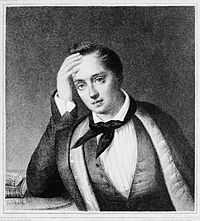Evgeny Baratynsky
| Yevgeny Baratynsky | |
|---|---|
 |
|
| Born | Yevgeny Abramovich Baratynsky 2 March 1800 Vyazhlya, Tambov Governorate, Russian Empire |
| Died | 11 July 1844 (aged 44) Naples, Italy |
| Occupation | Poet |
Yevgeny Abramovich Baratynsky (Russian: Евге́ний Абра́мович Бараты́нский; IPA: [jɪvˈɡʲenʲɪj ɐˈbraməvʲɪtɕ bərɐˈtɨnskʲɪj]; 2 March [O.S. 19 February] 1800 – 11 July 1844) was lauded by Alexander Pushkin as the finest Russian elegiac poet. After a long period when his reputation was on the wane, Baratynsky was rediscovered by Russian Symbolism poets as a supreme poet of thought.
A member of the noble Baratynsky, or, more accurately, Boratynsky family, the future poet received his education at the Page Corps at St. Petersburg, from which he was expelled at the age of 15 after stealing a snuffbox and five hundred roubles from the bureau of his accessory's uncle. After three years in the countryside and deep emotional turmoil he entered the army as a private.
In 1820 the young poet met Anton Delvig, who rallied his falling spirits and introduced him to the literary press. Soon the military posted Baratynsky to Finland, where he remained for six years. His first long poem, Eda, written during this period, established his reputation.
In January 1826 he married the daughter of Major-General . Through the interest of friends he obtained leave from the Emperor to retire from the army, and he settled in 1827 in Muranovo just north of Moscow (now a literary museum). There he completed his longest work, The Gipsy, a poem written in the style of Pushkin.
Baratynsky's family life seemed happy, but a profound melancholy remained the background of his mind and of his poetry. He published several books of verse which Pushkin and other perceptive critics praised highly, but which met with a comparatively cool reception from the public, and with violent ridicule on the part of the young journalists of the "plebeian party". As time went by, Baratynsky's mood progressed from pessimism to hopelessness, and elegy became his preferred form of expression. He died in 1844 at Naples, where he had gone in pursuit of a milder climate.
...
Wikipedia
